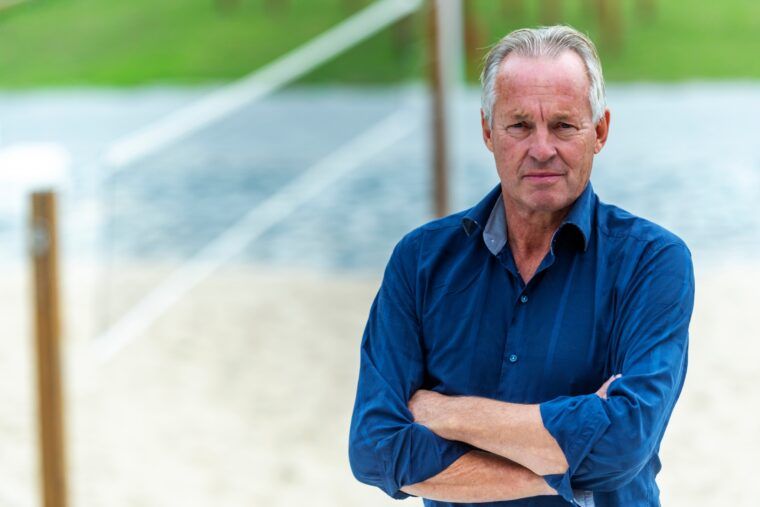20. Joop Alberda:'Success is all about communication and trust, not having success...also.'
A game that many coaches mention as their favorite one and also my personal favorite is the Olympic final at Atlanta in 1996, The Netherlands winning a 5 set match against Italy. Today we share the story of Joop Alberda, iconic coach of that Dutch team.

For this masterclass we start out with 2 excerpts that we copied from Joop's induction into the International Volleyball Hall of Fame.
'The architect of the highly successful Netherlands Men’s National Volleyball Teams of the 1990s, Joop Alberda soon became a legendary figure within the program and the sport. Even in his early years coaching, Alberda always had a sense of the system of training and coaching style necessary to be successful on the volleyball world stage.'
'After his golden mission, Alberda was approached by the Dutch Olympic Committee to serve as its Technical Director. Serving in that role from 1997 to 2004, the visionary Alberda was responsible for all sports-related issues such as innovation, coaching, Olympic facilities and programs. His direction of “Performance 2000” led to a record 25 Dutch medals at the 2000 Olympic Games in Sydney. He later served as the technical director for the Dutch Volleyball Federation from 2006 to 2010.'
Also in the last few years(Joop announced his retirement just days ago...more on that below) Joop was the technical director for the Dutch Volleyball Federation setting them up for even more future success.
Over the years Joop has been putting a lot of effort into various national and also smaller scale projects concerning the broader context of sports in the Dutch society, focusing on long term societal improvements in terms of movement and health.
Enter Joop...
Joop, tell us, how did you become a volleyball coach?
I was a gymnast and a soccer player and played a little bit of tennis. So I did a wide range of different sports. At one point I had to make a choice and I made the wrong choice.
I went into gymnastics, to find out that I was too tall and not strong enough. Then at 17 years of age I entered my physical education studies in Groningen(Holland).
I played some recreational volleyball and when I entered my studies, there was a possibility to become a member of a volleyball society. Over there someone developed a way of looking at talent and made me become a volleyball player.
I got addicted to the sport because of my fondness about statistics, the reproduction of the game and the sequence of the game.
In 1983-1984, I was selected to go to a certain conference in Båstad in Sweden.
The speakers there were Carmelo Bosco, Anders Kristiansson and Doug Beal. I don't think I slept any time at all, if I recall it correctly. It was one of the most exciting and thrilling experiences in my life.
We were discussing with them until four or five o'clock at night. And when I returned, I knew what my vision would be about volleyball and that I wanted to learn even more.
Volleyball was at that moment just starting to become a bit less recreational. Some Dutch teams, like Brother Martinus with Peter Murphy as a technical director were starting to get into serious volleyball.
I became the junior coach of the national junior team in 1980-1982. And my fascination with the game increased and increased.
I wanted to become a coach because I knew pretty fast that I was not going to be a good player. I was addicted to the game. But I knew that I was not tall enough. I was motivated by heart.
In the early days we practiced maybe more outside of the gym and outside of the club facility, we always went for an extra four or five workouts, by ourselves we would hire small venues to be able to do that.
So that's my basic story about becoming a head coach.
Knowing what you know now, which advice would you give to your younger self?
Everything is related to everything. I have trouble to see volleyball only as the skills and the team.
It's the skills, it's the people in the context of the society, in the context of their nature and their maturity.
It's in the context of communication, it's in the context of what does sport mean in your society? That's what fascinates me.
In my mind a team's interest is far more than what happens in the club. It's not only the team, it's also their individual education. It's the long-term vision for how you look at people as people.
How is your approach as a coach towards your players in general. This is something that changed in the late eighties because of a more 'positive behavior' coaching approach.
Not looking at the players and what they're doing wrong, but telling them what they're doing right. It took me about four or five years to get that shift in my mindset.
To me, mindset is the most crucial thing at the beginning of your coaching career.
After that you have that foundation you can pay attention to the crucial parts of the game, different strategies and not worrying about your own skills as a coach.
In the beginning you need to develop your skills.
As a coach for example you have to know how you have to coach someone who's 20 years old, and that that is completely different than coaching someone at 32 years of age.
Developing different policies for different players and handling the day to day of it for example, that's a thing that some coaches struggle with...
In your opinion is there a plan or a vision to being a successful coach?